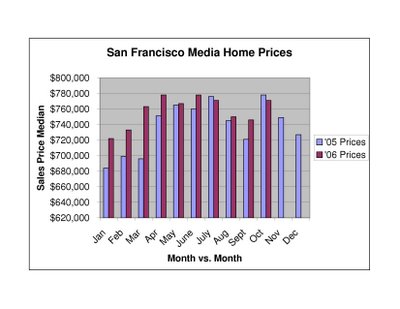Have you seen the commercial with guy asking "I'm thinking of a number between 300 and 800, do you know what it is?" For the life of me I can't recall what he's selling, but he's talking about Credit Scores. Fortunately you don't need him, or any other company trying to sell you something to get your scores. BUT, if you're going to buy a home, the higher your credit score, the more you can save in mortgage costs, so
checking your credit is a MUST. Do NOT under estimate these savings. And do not delay if you are thinking of Buying a home within the next 12 months because it takes time to clean up your credit reports.
Yes, I said report
S. There are three, but don't worry about that, just visit
www.AnnualCreditReport.com. By law, you get one free Credit Report per year for any reason. This one site will lead you to the three credit reporting agencies, Transunion, Equifax and Experian. To get your report is free, to get your score from each agency costs money. If you want to see your score, I highly recommend taking advantage of their initial offer when you first get to the site. You'll get a score for about $5 or $6, but if you wait to get your score, minutes later the cheapest you can get it is often $15. But the Reports are what I want you focused on. Or you can go to
MyFico.com
and get a free 30-day trial, but you must remember to cancel the membership. MyFico's home page also shows you what interest rates you can get by Score range. You'll see just how much it's worth to you.
Once you have all three, be sure to save them or print them out, and then pour through them looking for "bad" or mis-information. I found $10,000 in unpaid medical bills on one (only one) of the three bureau's reports, AND the bills were in someone elses name completely. Yet that name was on my report dragging down my score as if I actually had two names. What's more is that I actually was called about 10 different names on this same report. These were easy to fix, I called the 800# and the customer service guy had it all removed in minutes because it was so obviously not me or mine.
Aside from obvious mistakes, you should be looking for the following items:
1. credit card balances that are too high. High credit
limits are great, high balances are not. The ideal is to have balances that are 15.5% or lower vs. your limits. One way to improve your score is to pay down your balances, but another EQUALLY effective way is to call each of your credit card companies and ask for a limit increase. When you call, do NOT allow them to check your credit. If they insist, hang up and try again, OR ask for a supervisor, and the key question is "how much are you authorized to raise my limit to right now without damaging my credit score with an unecessary look?"
2. Too many "bad" cards. Close you department stores cards now. And stick with only the "best" names in banking and credit. AmEx is #1, then names like WellsFargo, Chase, CitiBank, Bank of America - are all good. ANYONE who does a LOT of TV advertising is BAD, BAD, BAD. You know who I mean... they advertise that they are good, but they are terrible for your credit. If you don't know who I mean, just stick with the advice - if they advertise on TV, stay away. When you do close a card, make sure the Credit Report says "Closed at Consumer Request". Do not let it say they closed it for you - that's bad.
3. "Inquiries" of your credit. If you go to a Dept store and agree to a credit card, they will check your credit. This is an inquiry, and drags your score down. If you did not authorize the inquiry, write a letter (yes, written is better, and certified mail is best, and the nastier, more threatening you are, is best-er :) You'll see on each Credit Report a long list of "soft" inquiries that the report lets you know does NOT effect your score. They don't, so don't worry about them. But if you got an inquiry, and didn't get the card, get rid of it. If they inquired, and you did get the card, there is proof you allowed it, so don't fight it.
4. Any late payments are bad. Fight these if you can... and that leads to advice on fighting anything on your report....
STEPS TO CLEAR UP YOUR REPORTS:
1. Put it in writing, send it certified mail, threaten the heck out of the Bureau. The squeaky wheel gets the oil, everyone else gets put into a big pile that barely gets touched
2. If they don't remove something, or they put it back on, then write a new letter asking for a "reinvestigation" and again, be nasty, and DEMAND that you be given the name, phone number and email address of the Bureau's representitive that did the reinvestigation, as well as the names and numbers of the people they contacted for the investigation. If this doesn't work the first time, the 2nd and 3rd reinvestiation certainly will get them to just take the problem item off.
3. Do not hire a 3rd party company to do the above for you. They charge too much, and generally have a non-skilled person just doing what I'm suggesting. But if you want to go the extra mile, find a lawyer who fights credit bureau's, and just CC him/her on every letter. Also threaten to report the Bureau to the FTC (Federal Trade Commission).
4. Start this 3+ months before you need it. If you pay your credit card balances down, they credit bureau's don't report that for 30 to 90 days. But even if you're buying in the next 30 days, you are better off doing it than not, so get started now.
There are other advanced suggestions, but this will take care of 95% of your problems, and dramatically raise your credit scores. And whatever you do, when you are in the process of buying a home, do NOT make any other big purchases like a car. If you do something to drag down your credit at the last second, you may not get a loan at all - or at least not one that is any where as good as what you were expecting.
Call or email me if you'd like to ask a question about your credit.
 rates this low, that's making my prediction a stronger one.
rates this low, that's making my prediction a stronger one.









